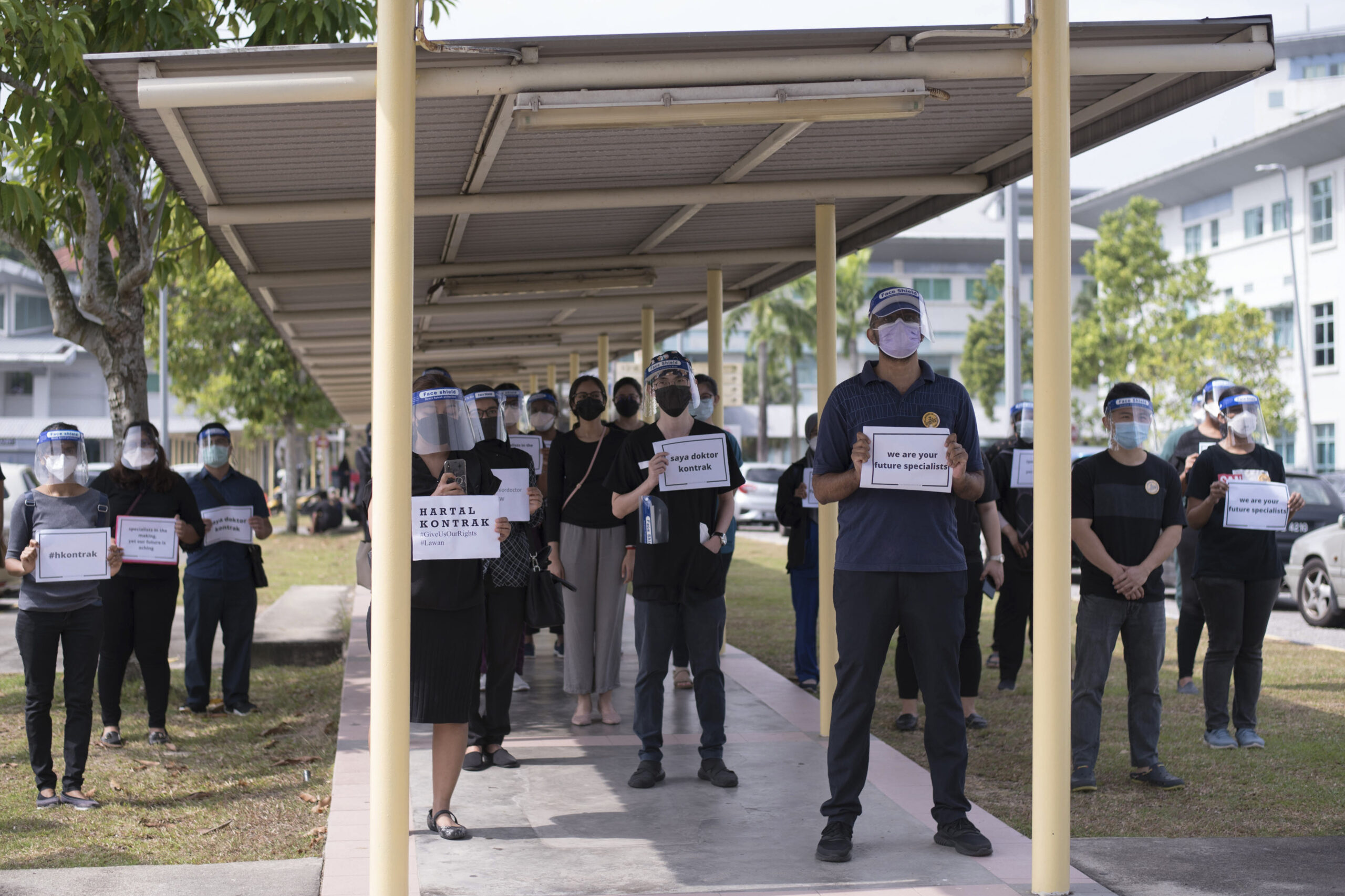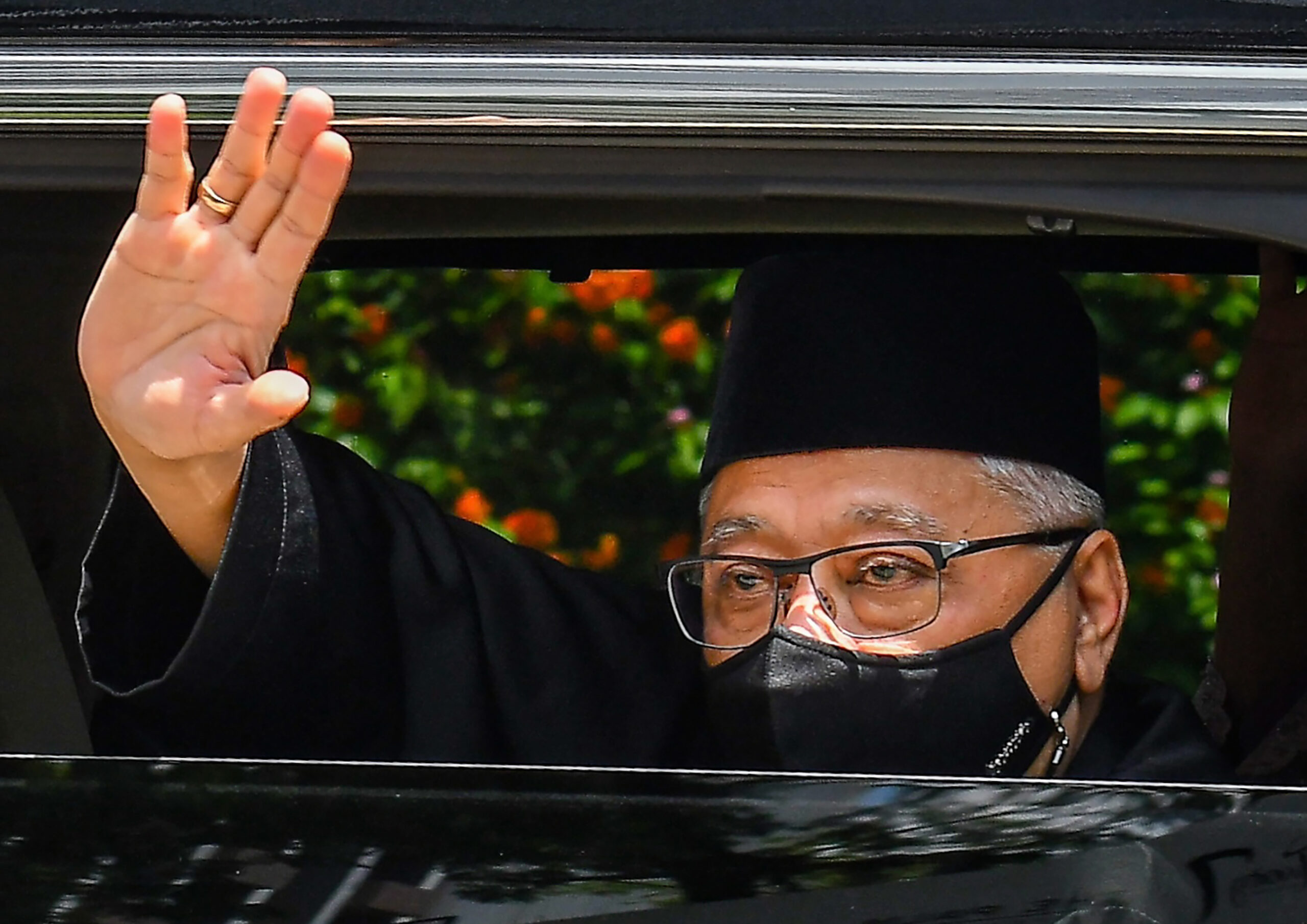Roziah Hashim and 25 other hospital contract cleaners hopped on their motorcycles in February to travel south with one mission in mind: to confront the Malaysian health minister about the plight of their fellow cleaners.
Over four days, the members of the National Union of Workers in Hospital Support and Allied Services (NUHWAS) drove 530 kilometres (329 miles) from the northwest city of Bukit Mertajam in Penang to Putrajaya, Malaysia’s administrative and judicial capital and home to many government offices. They made stops at several hospitals.
Gathered outside the Ministry of Health building, the motorcyclists and others chanted, “Long live, cleaner.” They waved purple and white banners displaying three demands to the government: eliminate the contract system and reinstate them as civil servants, provide a Covid-19 allowance and end harassment of their union.
As the country continues to grapple with the relentless coronavirus pandemic, Roziah and other workers have risked their lives ensuring a clean and sterile environment for patients suffering from Covid-19. Despite their crucial role on the frontlines of the virus, they receive low pay and few rights or benefits.
The movement by contract cleaners is similar to those by other workers demanding better wages and working conditions, which have gained momentum during the pandemic.
When contractors change at Malaysia’s hospitals, employees are absorbed as ‘new workers’ even if they have been employed in the same facility for more than 20 years.
“I have been working at the hospital for the past 15 years. But my salary is still the minimum wage of MYR1,200 ($300),” said Roziah, the NUHWAS president. “We had some benefits when we were government staff. But since we started being considered as a contractor under a private company, we have been stripped of any benefits.”
Roziah considered the motorcycle convoy a success.
“We met with the health minister. We went viral. The big boss himself met up with me and promised more frequent meetings. But we still have a lot to do,” she said. “We’ll visit all the hospitals and make sure the power gets returned to us cleaners. The fight isn’t over.”
Faced with stagnating wages, high unemployment, unaffordable housing and a lack of a social safety net resulting from the pandemic, Chong Yee Shan of the Party Socialist Malaysia (PSM) central committee said the public started to pay greater attention to workers rights and unions.
Contract doctors staged a nationwide walkout and protested outside hospitals for better job security in July, amplifying their message on social media with the hashtag #HartalDoktorKontrak.

Malaysian Prime Minister Ismail Sabri Yaakob announced on 19 March that a minimum wage increase from MYR1,200 ($285) to MYR1,500 ($356) per month will be implemented starting 1 May. The previous increase was in February 2020, rising from MYR1,100 ($261).
The push for the MYR1,500 minimum wage was initiated, primarily by the socialist party, six years ago.
“The government is making a big step of increasing to MYR1,500. It makes them look very progressive on this matter. However, if we look at the Department of Statistics report on our poverty line, we are actually far behind,” Chong said.
The country’s current poverty line income sits at MYR2,208 ($524).
“MYR1,500 is not a living wage,” Chong said. “Doesn’t matter if you are in the city or in the countryside.”
Especially nowadays… everything is priced so high. It’s still very difficult to live”
Liezl Galdo, domestic worker
Domestic worker Liezl Galdo, part of the trade union Association Of Nationalist Overseas Filipino Workers In Malaysia (AMPPO), has worked in Malaysia for the past 10 years.
“We’re lucky in a way that we get paid MYR1680, which is equivalent to $400. That’s what our [Philippine] government contract sets if anyone wants a Filipino domestic worker,” Galdo said.
She emphasises the key is knowing your worth and what you are entitled to as a worker: “Many of them don’t have time or know how to read the contract. So [they end up] without very basic human rights. They can’t even use their phones. We [at AMPPO] already helped a lot of people know their rights.”
While thrilled about the wage adjustment, she believes the amount is not enough.
“It’s really not that much. Especially nowadays with two years dealing with the pandemic, everything is [priced] so high. It’s still very difficult to live even with MYR1,680 ($400),” Galdo said.

Meeting inflation
A few days after the wage increase announcement, members of Malaysia’s private sector urged the government to reconsider.
“The RM1,500 ($356) minimum wage will push up the cost of goods and services and operation costs will definitely increase. This is not the time to implement any increase in minimum wage,” Malaysian Employers Federation President Syed Hussain Syed Husman said in a statement.
Federation of Malaysian Manufacturers President Soh Thian Lai made a similar argument, claiming a minimum wage adjustment should be implemented gradually to accommodate the rising costs of goods and services.
Grace Lee, Monash University Malaysia economics department head, said better wages and improved worker productivity are closely linked.
“When employers can better retain their workforce, workers can be trained to become more productive over time,” Lee said. “The proposed increase in the minimum wage is timelier than ever.”
Rashaad Ali, chief operating officer of the Social & Economic Research Institute, a Malaysian think tank, said the country’s wages have been stagnant for a long time, unable to keep up with inflation even with an increased minimum wage. A living wage is determined to provide a dignified standard of living and meet rising costs and can be tailored based on location.
“This approach is more dynamic than a static minimum wage, allowing for more equitable salaries that take inflation into account,” Rashaad said.
“A minimum wage doesn’t address the issue of low wages as much as it prevents financial exploitation of workers,” he added. “The reluctance to fairly compensate workers speaks volumes about the lack of worker protection in general.”
Young lawyers
In the midst of minimum wage negotiations, eight Malaysians calling themselves the Young Lawyers Movement (YLM) have attempted to fight for a fair pupil remuneration system. Pupils are legal trainees who undergo nine months of training under a senior lawyer before being called to the Malaysian Bar.
Pupils are not recognised as employees, receiving allowances instead of payslips. A survey by the Malaysian Bar found pupil allowances ranged up to MYR4,500 ($1,068) and down to nothing.
YLM member Cassandra Chung said the existence of zero-wage pupils is telling: “I guess it’s something we’ve just been conditioned to. It’s how the profession has run for a very long time. So we just accepted it.”
During the Malaysian Bar annual general meeting on 19 March, YLM submitted a motion to implement minimum pupil remuneration in line with the minimum wage or national poverty income line. The motion failed, partly because of an underwhelming turnout among young lawyers. Chung believes the many factors explaining the turnout include a pessimistic attitude toward change among young people.
YLM member Goh Cia Yee noted the irony in the new professionals being exploited: “We like to think that young lawyers that enter the profession, by virtue of them being an officer of the court, are someone who knows the law well and should be able to protect themselves from any [employment] exploitation.”
It’s hard to speak alone. There’s more protection when you speak together.”
Goh Cia Yee, Young Lawyers Movement member
“But the truth is that there are many young lawyers that don’t really know what to do when it comes to termination, dismissal or resignation, they don’t really understand the avenues available to them,” the criminal lawyer said.
The responsibility for obtaining fair compensation doesn’t fall solely on the pupil, Goh said, noting the power dynamic works to the advantage of senior attorneys.
“To be fair, their employers are lawyers who know the loopholes of the law,” he said. “They’re trained to be very persuasive, to be a master of their words. So they can be quite a scary opponent to go up against. That makes it hard for young lawyers to fight for themselves.”
“I think it only benefits the senior lawyer not to empower us with knowledge. So nobody will empower us. We have to empower ourselves,” Goh said. “It’s hard to speak alone. There’s more protection when you speak together.”
The young attorneys continue to fight, attempting to attain a measure of power through their numbers.
“We’re hoping that as YLM continues to push, [more] will come to realise that we [have] got to stand up for ourselves,” Chung said, urging others to attend meetings and support the movement.
As Malaysian public discourse appears to include more discussion of workers rights and compensation, Chong Yee Shan of PSM believes unionisation and an increase in supporters can help tackle systematic problems for workers.
“Having many strong unions would [allow us] to become a coalition and have an even bigger voice,” Chong Yee Shan said. “It will definitely give [employers] more pressure and we’ll have more bargaining power with the government.”


